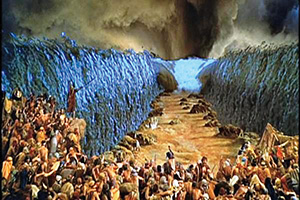
The power of connecting to others and bringing the welfare of other people into our consciousness is demonstrated by a very powerful anomaly that occurred at Krias Yam Suf (parting of the Red Sea). It was high drama at its best. Try to visualize the scene unfolding. The sea had split into 12 smoothly paved roads for the tribes to travel through. Each of the dozen paths was a towering wall of frozen water that moments before was a raging sea. Springs of fresh water were available along the paths from the walls to quench one’s thirst. It was surreal.
Yet, the Midrash picks up on a single missing letter in the word “chomah,” wall, referring to the walls of water. It’s spelled without a vav and can be read as cheima—anger. It seems the angels were none too pleased about Jews getting this special treatment. After all, they said to Hashem, Jews were idol worshippers in Egypt, just like the Egyptians. Why split the sea for the Jews and drown the Egyptians? They both deserve the same fate!
This heavenly challenge by the angels begs an even bigger question: why complain now?? The 10 plagues unfolded over an entire year and only the Egyptians were affected, not the Jews. Why did the angels not have the same complaint of special treatment during the 10 plagues?
An eye-opening answer is given by Rav Meir Simcha of Dvinsk in his incredible sefer Meshech Chochma. If we analyze punishments in the Torah for specific transgressions, we find culpability varies hugely by who commits the crime: a tzibur (group), or an individual.
A careful examination of history shows Hashem can be severe in His punishments for minor infractions, and at other times be lenient for major crimes. For example, in the Generation of the Flood, Hashem destroyed the world because of extortion. You might think this was not serious enough to merit destruction, but a major factor was that this crime was committed by individuals against others, in an environment lacking unity among the people! In another case, Dovid Hamelech’s men, all of them righteous, fell in war because there was a lack of achdus (unity). Yet, in the time of the wicked King Achav, no soldier fell in battle—because they did have achdus.
On a spiritually grander scale, the first Beis Hamikdash was destroyed because the Jews were guilty of severe capital crimes: idolatry, adultery and murder, yet the exile lasted a relatively short 70 years. The second Beis Hamikdash was destroyed because of baseless hatred, hardly a capital crime, yet the exile continues to this very day! Why?
We learn from these examples that Hashem deals with a group very differently from an individual.
The bottom line: Hashem wants unity in His people and relates to a united group with much greater compassion than to an individual. Unity in a group is very powerful: it can delay or greatly mitigate a punishment. An individual doesn’t receive this special protection. On the flip side, if a group splinters and argues, its culpability for a crime is greater than an individual receives for the same crime. During the time of Noah, petty thievery by society led to world destruction.
Now let’s get back to our angels in Egypt. The Midrash recounts that the Jews had a tremendous sense of unity in Egypt; this protected them during the Ten Plagues and it was a key merit in their redemption. However, when the Jews were surrounded by the Egyptians at the edge of the sea, the Bnei Yisrael became divided into four factions. Some wanted to return, some wanted to fight, others wanted to make a commotion and scare the Egyptians, and the last group wanted to jump into the sea. They had no common voice, no unity. That’s why the angels complained at that time and not previously during the plagues.
There is no arguing the power and importance of what an individual can accomplish. Still, we must never lose sight that we are one people and we must care for each other and treat each other with great respect. The power of our prayer becomes stronger as we unite to form a minyan. The brachos of Shemoneh Esrei are all written in plural form, requesting Hashem’s help for all of klal Yisrael.
Focusing on and achieving unity is one of the great challenges of our exile. Life can be overwhelming at times; it’s easy to become self-absorbed with our many issues and challenges. However, if we step out of ourselves and unite with others in prayer and in helping our fellow man, we can evoke an entirely new showering of compassion by Hashem upon us… even if we may not deserve it.
By Rabbi Baruch Bodenheim
Rabbi Baruch Bodenheim is the associate rosh yeshiva of Passaic Torah Institute (PTI)/Yeshiva Ner Boruch. PTI has attracted people from all over northern New Jersey, including Teaneck, Bergenfield, Paramus, Rockaway and Fair Lawn. He initiated and continues to lead a full multi-level Gemara learning program in the evenings, gives Halacha and hashkafa shiurim on Shabbos and, more recently, has spread out beyond PTI to begin a weekly beis midrash program with in-depth chavrusa learning in both Livingston and Springfield.










